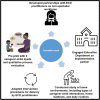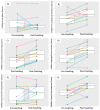This is a preprint.
Improving access to early intervention for autism - findings from a proof-of-principle cascaded task-sharing naturalistic developmental behavioural intervention in South Africa
- PMID: 36909555
- PMCID: PMC10002833
- DOI: 10.21203/rs.3.rs-2624968/v1
Improving access to early intervention for autism - findings from a proof-of-principle cascaded task-sharing naturalistic developmental behavioural intervention in South Africa
Update in
-
Improving access to early intervention for autism: findings from a proof-of-principle cascaded task-sharing naturalistic developmental behavioural intervention in South Africa.Child Adolesc Psychiatry Ment Health. 2023 May 20;17(1):64. doi: 10.1186/s13034-023-00611-0. Child Adolesc Psychiatry Ment Health. 2023. PMID: 37210513 Free PMC article.
Abstract
Background Despite the high number of children living with neurodevelopmental disabilities in sub-Saharan Africa, access to early intervention is almost non-existent. It is therefore important to develop feasible, scalable early autism intervention that can be integrated into systems of care. While Naturalistic Developmental Behavioural Intervention (NDBI) has emerged as an evidence-based intervention approach, implementation gaps exist globally, and task-sharing approaches may address access gaps. In this South African proof-of-principle pilot study, we set out to answer two questions about a 12-session cascaded task-sharing NDBI - whether the approach could be delivered with fidelity, and whether we could identify signals of change in child and caregiver outcomes. Methods We utilized a single-arm pre-post design. Fidelity (non-specialists, caregivers), caregiver outcomes (stress, sense of competence), and child outcomes (developmental, adaptive) were measured at baseline (T1) and follow-up (T2). Ten caregiver-child dyads and four non-specialists participated. Pre-to-post summary statistics were presented alongside individual trajectories. Non-parametric Wilcoxon signed rank test for paired samples was used to compare group medians between T1 and T2. Results Caregiver implementation fidelity increased in 10/10 participants. Non-specialists demonstrated a significant increase in coaching fidelity (increases in 7/10 dyads). Significant gains were seen on two Griffiths-III subscales (Language/Communication - 9/10 improved, Foundations of Learning - 10/10 improved) and on the General Developmental Quotient (9/10 improved). Significant gains were also seen on two Vineland Adaptive Behaviour Scales (Third Edition) subscales (Communication - 9/10 improved, Socialization - 6/10 improved) and in the Adaptive Behaviour Standard Score (9/10 improved). Caregiver sense of competence improved in 7/10 caregivers and caregiver stress in 6/10 caregivers. Conclusions This proof-of-principle pilot study of the first cascaded task-sharing NDBI in Sub-Saharan Africa provided fidelity and intervention outcome data which supported the potential of such approaches in low-resource contexts. Larger studies are needed to expand on the evidence-base and answer questions on intervention effectiveness and implementation outcomes.
Conflict of interest statement
Figures








References
-
- World Health Organization. Meeting report: autism spectrum disorders and other developmental disorders: from raising awareness to building capacity. Switzerland: Geneva; 2013.
-
- Olusanya BO, Davis AC, Wertlieb D, Boo N-Y, Nair MKC, Halpern R et al. (2018). Developmental disabilities among children younger than 5 years in 195 countries and territories, 1990–2016: a systematic analysis for the Global Burden of Disease Study 2016. Lancet Glob Health. 2018;6(10):e1100–e1121. doi. 10.1016/S2214- - DOI - PMC - PubMed
Publication types
Grants and funding
LinkOut - more resources
Full Text Sources

